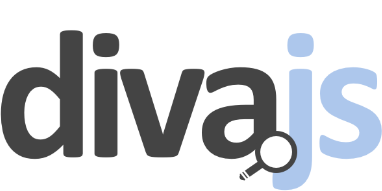Diva.js (Document Image Viewer with AJAX) is a JavaScript book image viewer designed to present multi-page documents at multiple resolutions.
Version 5.0 contains many new features and improvements:
- Page images are now rendered using the HTML Canvas, allowing us to support “smooth” zooming.
- Improved IIIF support: Easily toggle “non-paged” pages' visibility and search for pages based on their label name.
- Complete re-organization of the source code. We now use ES6, WebPack, and Karma. This makes both the development process and code debugging much easier.
For a complete list of new features, bug fixes and API changes, view the changelog.
Overview
There are two components to a functioning Diva system:
- An image server. Either IIP Image Server with Diva's JSON measurement data file or any other IIIF-compatible image server.
- The Diva.js jQuery plugin. The embedded web application that displays the images in a browser.
If using IIP, your document image files must be processed into either Pyramid TIFF or JPEG2000 format. We provide a script to easily do this.
Details
If using IIIF
Diva.js is an image viewing client compatible with version 2.0 of the IIIF Image and Presentation APIs. Simply supply the path to a valid IIIF Manifest and Diva will display the document as described by the metadata (see Installing).
If using IIP
IIP creates the image tiles and other image representations "on the fly". Instructions for building and installing IIP are available on the project's website. If you want to support JPEG 2000 you will either need to download a pre-compiled version (available on the Old Maps Online site) or purchase the Kakadu libraries and build it yourself.
Diva relies on a JavaScript Object Notation (JSON) file that contains data about your document. This JSON file is automatically generated when you use the image conversion scripts that we distribute with Diva. These files can be served using a regular web server.
There are two image formats supported by IIP: Pyramid TIFF and, with the inclusion of the Kakadu libraries, JPEG2000. These formats support multiple file resolutions and image tiling.
Installing
From a CDN (hosted)
Downloading the Diva.js release package provides access to image processing scripts and demos of possible configurations. If you don't need these you can skip downloading and simply paste the following tags into the <head> of any webpage to include all the files necessary to use Diva.js.
<link rel="stylesheet" href="//cdnjs.cloudflare.com/ajax/libs/diva.js/4.1.0/css/diva.min.css" />
<script src="//ajax.googleapis.com/ajax/libs/jquery/2.1.4/jquery.min.js"></script>
<script src="//cdnjs.cloudflare.com/ajax/libs/diva.js/4.1.0/js/diva.min.js"></script>
Locally (release package)
Download the latest release of Diva. In the diva.js directory you can find a pre-compiled version. The css and js directories contain the files necessary to use Diva. Simply include jQuery 2.x, css/diva.min.css and js/diva.min.js in the <head> of your webpage, as shown in the HTML source of the demo pages. You will also find some helper scripts for processing your image files.
Basic setup
After including the necessary files, the most basic Diva viewer is instantiated with three (IIP) or one (IIIF) required parameter(s):
<script>
$('#diva-wrapper').diva({
iipServerURL: "http://www.example.com/fcgi-bin/iipsrv.fcgi",
objectData: "http://www.example.com/beromunster.json",
imageDir: "/mnt/images/beromunster"
});
</script>
Required for IIP and IIIF:
-
objectData: The URL (absolute or relative) to the document's.jsonfile, or a IIIF Manifest
Required for IIP:
-
iipServerURL: The URL to your IIP installation. In most cases this should point to the iipsrv.fcgi file; -
imageDir: Either the absolute path to your images on your server, OR the path relative to your IIP installation'sFILESYSTEM_PREFIXconfiguration option.
The #diva-wrapper selector points to a div element within which the document viewer will appear.
See Installation for full instructions.
Running the Demos
Running the demos works best using a web server. The easiest is to use Python to start a small web server in the diva.js directory (or build if you have the source code):
$> cd diva-v3.0.0/diva.js/ # (or cd diva.js/build)
$> python -m SimpleHTTPServer
Serving HTTP on 0.0.0.0 port 8000 ...
You may then load the demos in your web browser by visiting http://localhost:8000 in your browser.
Building from source
If you wish to install from source, first you must install node.js and npm. Then, check out the code from our GitHub repository or run npm install diva.js. Once you've obtained the code, change to the project directory and run npm install -g gulp then npm install to fetch all development dependencies.
The full installation gives you access to the un-minified JavaScript source, the plugins, the documentation, and our unit-tests. We use gulp as our build system and for other development tasks.
gulp develop // Runs a webserver at localhost:9001 and automatically builds and reloads upon changes
gulp develop:build // Compiles the Javascript and LESS source and places it in the build/ directory
gulp develop:test // Runs the unit tests and outputs a report to the console
Run gulp develop and navigate to http://localhost:9001/demo in your web browser to see the demo.
See Installation for more information.
Getting help
Help for Diva.js is available through this repository's wiki, in the form of code documentation, installation instructions and usage tips.
Cross-site Requests
You may receive an error that looks something like this:
XMLHttpRequest cannot load http://example.com/demo/imagefiles.json. No 'Access-Control-Allow-Origin' header is present on the requested resource. Origin 'http://localhost:8000' is therefore not allowed access.
This is a security precaution that all browsers use to prevent cross-site request forgeries. If you receive this message it is because your objectData parameter and the server used to serve the Diva page are not at the same server address.
To fix this you must ensure that the Diva HTML page, and the location pointed to by the objectData page are being served by the same server, or you must create an exception using the Access-Control-Allow-Origin header on your server to explicitly white-list the objectData location.
Let Us Know
We're developing Diva.js as part of our research in Distributed Digital Music Libraries. If you use it in your project, it would be great if you could let us know.
